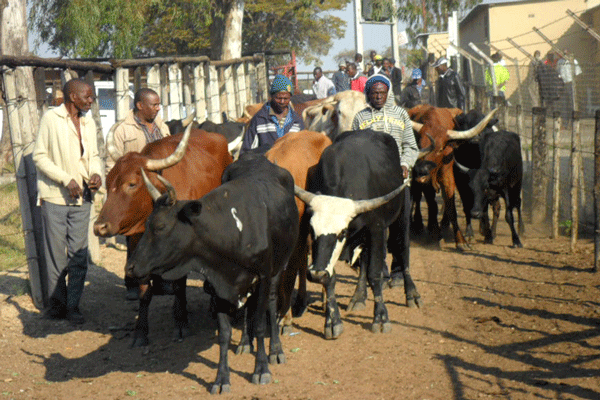
FARMERS have called on government to restructure the marketing of livestock, saying the current system is promoting the creation of cartels in the country.
BY MTHANDAZO NYONI
Farmers who spoke to Standardbusiness last week complained that cartels were rampant in the country due to liberalisation of the livestock marketing structure.
A cartel, according to Investopedia, is an organisation created from a formal agreement between a group of producers of a good or service to regulate supply in an effort to regulate or manipulate prices.
“There is a cartel in this country that is deliberately suppressing prices of livestock.
“The auctioneer is the buyer and he has set up people who pretend not to know him, yet they are his people.
“That same person is also the abattoir operator and he is again a butchery operator,” Livestock Farmers’ Union national chairperson Sifiso Sibanda said.
“So because the auctioneer is the abattoir operator and is also the butchery operator as well as the buyer, he deliberately suppresses prices and at the end of the day, when he is suppressing prices, he is making a mark-up in his butchery and his abattoir. That is what they are doing.”
- Chamisa under fire over US$120K donation
- Mavhunga puts DeMbare into Chibuku quarterfinals
- Pension funds bet on Cabora Bassa oilfields
- Councils defy govt fire tender directive
Keep Reading
Sibanda said there was need to unbundle and restructure the marketing of livestock. He urged government to come up with strong legislation for that.
“We need a situation whereby the auctioneer is not in any way a buyer nor an abattoir operator or a butchery operator because that is conflict of interest,” he said.
“His role must be to facilitate the auction aspect only; the buying and selling of animals without him being a player in the value chain.
“An abattoir operator must operate an abattoir and not run butcheries.
“It is a conflict of interest for you to be an abattoir operator and at the end of the day you are running a butchery. You are literally supplying yourself.”
He said butchery operators should get the meat from abattoirs.
“Don’t give them the leeway to slaughter from rural areas and bring uninspected meat into town.
“Let them bring inspected meat from abattoirs and then go and do the retail aspect.
“The abattoir is a wholesaler of meat; the butchery operator is a retailer of meat,” he said.
“Right now there is a big livestock cartel that has killed the livestock sector. The challenge that the farmers have is that we don’t have a proper structure of marketing animals. “And because we don’t have a proper structure, those who have money literally took over the running of cattle sales in rural areas.”
Farmers said the situation was exacerbated by the demise of the Cold Storage Company (CSC), which used to be the main auctioneer for livestock.
Following the demise of the CSC, farmers were left vulnerable. Initially, in a bid to solve the matter, government decided to giver rural districts councils (RDCs) authority to run livestock auctions, but they failed.
The failure by RDCs to run cattle auctions left farmers vulnerable to private cattle buyers who rip them off even more.
Federation of Farmers’ Union president Wonder Chabikwa said government should expedite the revival of the CSC because the current system is killing the livestock sector.
“This is a liberalised system that we are not happy about. We want to revert to the old system where farmers were able to sell their animals to CSC.
“We had proper systems that were in place. The current system is exposing farmers to these unscrupulous players who are ripping them off,” said Chabikwa, who is also the Zimbabwe Commercial Farmers’ Union president.
“We want government to intervene because farmers are being fleeced by these people.
“The current system makes livestock farming unviable and as such discourages them. We want CSC to be revived.”
In the old system, Chabikwa said government used to have proper marketing structures for the livestock industry whereby farmers sold their animals to CSC.
But with the coming in of the Economic Structural Adjustment Programme, the system was liberalised, exposing farmers to livestock cartels.
A Gwanda-based small livestock farmer, Solomon Linda, said besides the issue of livestock cartels, farmers had a challenge with middlemen who usually bought animals at very low prices.
“We also have a challenge of cash. As such, those with cash are taking advantage of that, cheating farmers,” he said.
According to Linda, prices of cattle for breeding ranged between $40 and $60, depending on type and size. Steers ranged between $350 and $500, he said.
Lands, Agriculture and Rural Resettlement deputy minister David Marapira said the solution to livestock cartels was the revival of CSC.
“As government we are going to come up with a solution. We are going to open all CSC facilities as soon as possible. So that will be the solution to this cartel thing. All farmers will now sell their animals to CSC,” he said.
CSC was one of Zimbabwe’s most strategic assets, earning the country at least $45 million annually before its collapse.
It is currently operating below 10% of its capacity and reported to be making annual losses in the region of $6 million.
The parastatal is saddled with a debt of more than $25 million mainly as a result of fixed costs such as wages, rates and taxes on land and is in dispute with its creditors, including 413 former workers, who are owed about $4 million in salary arrears.











